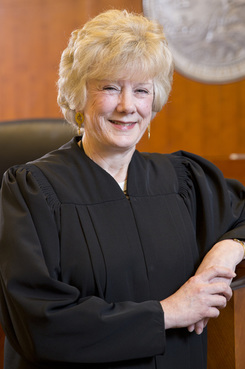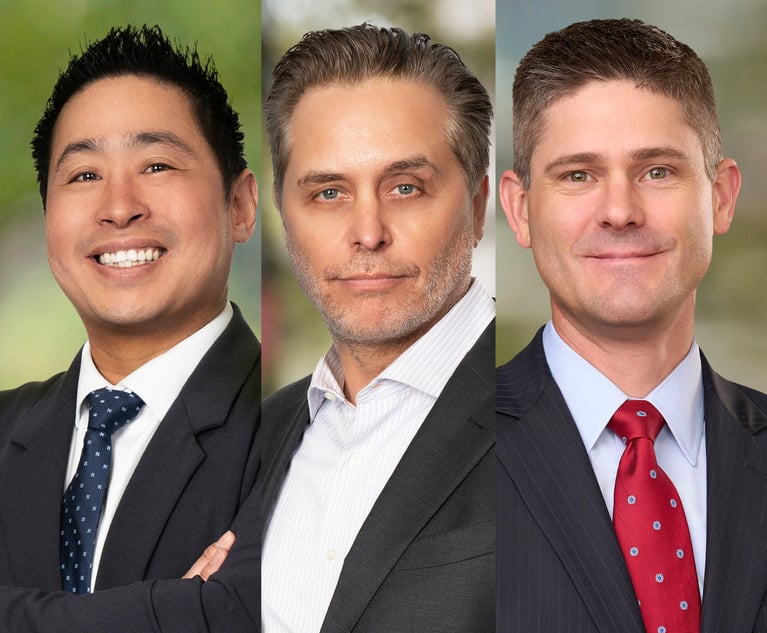Why SF Judge Turned Down Class Claims in Twitter Bias Case
"This court concludes that plaintiff failed to satisfy the commonality requirement necessary to certify the proposed class," San Francisco Judge Mary Wiss wrote.
July 05, 2018 at 06:32 PM
5 minute read
 Twitter headquarters in San Francisco. Credit: Jason Doiy/ The Recorder
Twitter headquarters in San Francisco. Credit: Jason Doiy/ The Recorder
Twitter Inc. has successfully fought off class action claims from female software engineers who alleged a “boys club” and “brogrammer culture” at the social media company prevents women from receiving equal opportunities compared to male counterparts.
Lawyers for former Twitter engineer Tina Huang had pushed to certify a class of 135 female software engineers. Huang's suit in San Francisco Superior Court claims the company's promotion system favors men over women in getting shots at top jobs.
Superior Court Judge Mary Wiss, ruling on July 3 against class certification, pointed to the U.S. Supreme Court's 2011 decision Walmart Stores v. Dukes. The ruling made it more difficult for plaintiffs to get class actions certified. Disparate impact alone is not enough to allow a class to form.
 Judge Mary Wiss. Credit: Jason Doiy/ ALM
Judge Mary Wiss. Credit: Jason Doiy/ ALM“This court concludes that plaintiff failed to satisfy the commonality requirement necessary to certify the proposed class,” Wiss wrote. “In addition, the court also finds that plaintiff's claims are not typical of the class, and that plaintiff failed to demonstrate that the class action mechanism is the superior method for adjudicating class members' claims in this case.”
The ruling for Twitter is the second in recent weeks in which workers lost a class certification battle with a major tech company. Microsoft Corp. recently brushed off class certification as part of a gender bias lawsuit in a Seattle federal court. Orrick, Herrington & Sutcliffe attorneys represent Twitter and Microsoft in their respective cases.
Huang's attorney Jason Lohr said he will likely appeal the ruling from Wiss. Lohr cited the “steep hill” presented for such lawsuits seeking class certification. He said he is skeptical of the court's interpretations of the Supreme Court ruling.
“Of course, we are disappointed with the ruling. It's yet another ruling that is supported by Dukes,” said Lohr of San Francisco's Lohr Ripamonti & Segarich. “Dukes was 1.5 million people. Microsoft was 8,500. Our class is 135 individuals who can't get certified. These rulings are basically saying no class of women in similar circumstances can get certified.”
A lawyer for Twitter, Orrick employment partner Lynne Hermle, was not immediately reached for comment Thursday.
➤➤ Get employment law news and commentary straight to your inbox with Labor of Law, a new Law.com briefing. Sign up here.
Huang, who joined Twitter in 2009 as one of the company's first female engineers, sued the company in 2015 after she failed to receive a promotion for which she says was qualified. She filed for class certification last year on behalf of fellow female engineers.
The discrimination case against Twitter was one of several pending against Silicon Valley companies confronting labor and employment practices. Plaintiffs have targeted tech companies for alleged unequal treatment of women and minorities. Other ongoing lawsuits confront gender equity at Google Inc. and Oracle Corp.
In March, Wiss did allow pay-equity class claims to move forward against Google. In that case, the judge found a uniform practice that would unify a proposed class of thousands of women. She approved the proposed class in part, citing a policy at the company that considers prior salary in the hiring process to set compensation. That policy could perpetuate gender pay gaps, Wiss concluded.
James Finberg at Altshuler Berzon in San Francisco, who represented the plaintiffs against Google, told The Recorder at the time that “the case lays out a road map for how to certify a gender pay equity case.” A companywide policy that uses prior pay to determine salary “can serve as a basis for certifying a class of the person's subject to the policy.”
Lohr maintains a uniform policy can be identified at Twitter, as well. He said the rules that govern promotions is a common policy. As for next steps, he said, “We'll just carry on.”
Read the class certification ruling in Huang v. Twitter below:
This content has been archived. It is available through our partners, LexisNexis® and Bloomberg Law.
To view this content, please continue to their sites.
Not a Lexis Subscriber?
Subscribe Now
Not a Bloomberg Law Subscriber?
Subscribe Now
NOT FOR REPRINT
© 2025 ALM Global, LLC, All Rights Reserved. Request academic re-use from www.copyright.com. All other uses, submit a request to [email protected]. For more information visit Asset & Logo Licensing.
You Might Like
View All
White & Case KOs Claims Against Voltage LLC in Solar Companies' Trade Dispute

Goodwin Procter Relocates to Renewable-Powered Office in San Francisco’s Financial District

Polsinelli Picks Up Corporate Health Care Partner From Greenberg Traurig in LA

Perkins Coie Lures Former Longtime Wilson Sonsini Tech Transactions Partner
Trending Stories
- 1Chief Judge Joins Panel Exploring Causes for Public's Eroding Faith in NY Legal System
- 2Pogo Stick Maker Wants Financing Company to Pay $20M After Bailing Out Client
- 3Goldman Sachs Secures Dismissal of Celebrity Manager's Lawsuit Over Failed Deal
- 4Trump Moves to Withdraw Applications to Halt Now-Completed Sentencing
- 5Trump's RTO Mandate May Have Some Gov't Lawyers Polishing Their Resumes
Who Got The Work
J. Brugh Lower of Gibbons has entered an appearance for industrial equipment supplier Devco Corporation in a pending trademark infringement lawsuit. The suit, accusing the defendant of selling knock-off Graco products, was filed Dec. 18 in New Jersey District Court by Rivkin Radler on behalf of Graco Inc. and Graco Minnesota. The case, assigned to U.S. District Judge Zahid N. Quraishi, is 3:24-cv-11294, Graco Inc. et al v. Devco Corporation.
Who Got The Work
Rebecca Maller-Stein and Kent A. Yalowitz of Arnold & Porter Kaye Scholer have entered their appearances for Hanaco Venture Capital and its executives, Lior Prosor and David Frankel, in a pending securities lawsuit. The action, filed on Dec. 24 in New York Southern District Court by Zell, Aron & Co. on behalf of Goldeneye Advisors, accuses the defendants of negligently and fraudulently managing the plaintiff's $1 million investment. The case, assigned to U.S. District Judge Vernon S. Broderick, is 1:24-cv-09918, Goldeneye Advisors, LLC v. Hanaco Venture Capital, Ltd. et al.
Who Got The Work
Attorneys from A&O Shearman has stepped in as defense counsel for Toronto-Dominion Bank and other defendants in a pending securities class action. The suit, filed Dec. 11 in New York Southern District Court by Bleichmar Fonti & Auld, accuses the defendants of concealing the bank's 'pervasive' deficiencies in regards to its compliance with the Bank Secrecy Act and the quality of its anti-money laundering controls. The case, assigned to U.S. District Judge Arun Subramanian, is 1:24-cv-09445, Gonzalez v. The Toronto-Dominion Bank et al.
Who Got The Work
Crown Castle International, a Pennsylvania company providing shared communications infrastructure, has turned to Luke D. Wolf of Gordon Rees Scully Mansukhani to fend off a pending breach-of-contract lawsuit. The court action, filed Nov. 25 in Michigan Eastern District Court by Hooper Hathaway PC on behalf of The Town Residences LLC, accuses Crown Castle of failing to transfer approximately $30,000 in utility payments from T-Mobile in breach of a roof-top lease and assignment agreement. The case, assigned to U.S. District Judge Susan K. Declercq, is 2:24-cv-13131, The Town Residences LLC v. T-Mobile US, Inc. et al.
Who Got The Work
Wilfred P. Coronato and Daniel M. Schwartz of McCarter & English have stepped in as defense counsel to Electrolux Home Products Inc. in a pending product liability lawsuit. The court action, filed Nov. 26 in New York Eastern District Court by Poulos Lopiccolo PC and Nagel Rice LLP on behalf of David Stern, alleges that the defendant's refrigerators’ drawers and shelving repeatedly break and fall apart within months after purchase. The case, assigned to U.S. District Judge Joan M. Azrack, is 2:24-cv-08204, Stern v. Electrolux Home Products, Inc.
Featured Firms
Law Offices of Gary Martin Hays & Associates, P.C.
(470) 294-1674
Law Offices of Mark E. Salomone
(857) 444-6468
Smith & Hassler
(713) 739-1250






